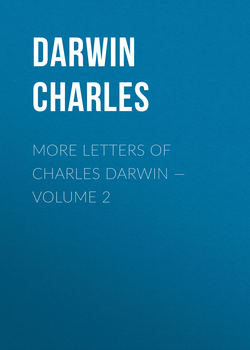More Letters of Charles Darwin — Volume 2

Реклама. ООО «ЛитРес», ИНН: 7719571260.
Оглавление
Darwin Charles. More Letters of Charles Darwin — Volume 2
MORE LETTERS OF CHARLES DARWIN
VOLUME II
CHAPTER 2.VII. — GEOGRAPHICAL DISTRIBUTION
CHAPTER 2.VIII. — MAN
CHAPTER 2.IX. GEOLOGY, 1840-1882
CHAPTER 2.X. — BOTANY, 1843-1871
CHAPTER 2.XI. — BOTANY, 1863-1881
CHAPTER 2.XII
Отрывок из книги
LETTER 378. J.D. HOOKER TO CHARLES DARWIN. Kew, January 20th, 1867.
Prof. Miquel, of Utrecht, begs me to ask you for your carte, and offers his in return. I grieve to bother you on such a subject. I am sick and tired of this carte correspondence. I cannot conceive what Humboldt's Pyrenean violet is: no such is mentioned in Webb, and no alpine one at all. I am sorry I forgot to mention the stronger African affinity of the eastern Canary Islands. Thank you for mentioning it. I cannot admit, without further analysis, that most of the peculiar Atlantic Islands genera were derived from Europe, and have since become extinct there. I have rather thought that many are only altered forms of existing European genera; but this is a very difficult point, and would require a careful study of such genera and allies with this object in view. The subject has often presented itself to me as a grand one for analytic botany. No doubt its establishment would account for the community of the peculiar genera on the several groups and islets, but whilst so many species are common we must allow for a good deal of migration of peculiar genera too.
.....
As I feared, I cannot be of the least use to you. I could not venture to say anything about babies without reading my Expression book and paper on Infants, or about animals without reading the "Descent of Man" and referring to my notes; and it is a great wrench to my mind to change from one subject to another.
I will, however, hazard one or two remarks. Firstly, I should have thought that the word "love" (not sexual passion), as shown very low in the scale, to offspring and apparently to comrades, ought to have come in more prominently in your table than appears to be the case. Secondly, if you give any instance of the appreciation of different stimulants by plants, there is a much better case than that given by you — namely, that of the glands of Drosera, which can be touched roughly two or three times and do not transmit any effect, but do so if pressed by a weight of 1/78000 grain ("Insectivorous Plants" 263). On the other hand, the filament of Dionoea may be quietly loaded with a much greater weight, while a touch by a hair causes the lobes to close instantly. This has always seemed to me a marvellous fact. Thirdly, I have been accustomed to look at the coming in of the sense of pleasure and pain as one of the most important steps in the development of mind, and I should think it ought to be prominent in your table. The sort of progress which I have imagined is that a stimulus produced some effect at the point affected, and that the effect radiated at first in all directions, and then that certain definite advantageous lines of transmission were acquired, inducing definite reaction in certain lines. Such transmission afterwards became associated in some unknown way with pleasure or pain. These sensations led at first to all sorts of violent action, such as the wriggling of a worm, which was of some use. All the organs of sense would be at the same time excited. Afterwards definite lines of action would be found to be the most useful, and so would be practised. But it is of no use my giving you my crude notions.
.....